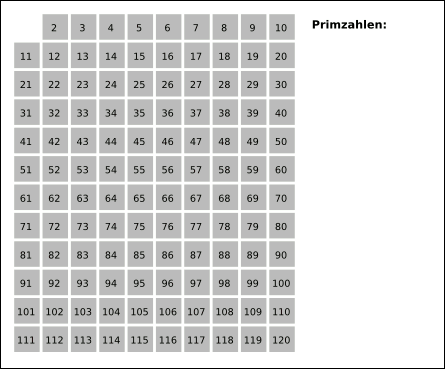Two ways to check if p is a prime number:
- The rest of the division is zero for all lower numbers except the 1 and the number p .
- Wilson's theorem states that an integer is prime if and only if the factorial of p-1 is equivalent to -1 modulo p.
(p - 1)! + 1 ≡ 0 (mod p).
Source: http://fr.wikipedia.org/wiki/Th%C3%A9or%C3%A8me_de_Wilson
We'll use the first method.
Program that checks if an integer is a prime number:
using namespace std; #include< iostream> #include< stdlib.h> int main() { int nb,r=0; cost< < "Enter a number: "; cin> > nb; for(int i = 1 ; i <= nb ; i++ ) { if(nb % i == 0) { r++; } } if(r> 2) cost< < nb< < " is not a prime number"< < endl; else cost< < nb< < " is a prime number"< < endl; system("pause"); } |
Program that checks whether the n numbers entered are prime:
| #include< stdio.h> #include< stdlib.h> int main() { int number=1 counter=0; int i,r,n=100; while(counter< n){//the first n r=0; //to count the number of divisors number++; for (i=1 ; i<=number; i++) { if ((number%i)==0) r++; } if(r==2)//The prime number is divided into 1 and itself { printf(" %d \n", number); //we increment the counter counter++; } } system("pause"); } |
Program that displays all Prime Numbers Lower Levels at n:
| #include< stdio.h> #include< stdlib.h> int main() { int number=1 counter=0; int i,r,n=100; printf("Prime numbers less than %d are:\n",n); while(number < n){//as long as number < n then r=0; //to count the number of divisors number++; for (i=1 ; i<=number; i++) { if ((number%i)==0) r++; } if(r==2)//The prime number is divided into 1 and itself { printf(" %d \n", number); } } system("pause"); } |
Procedure:
Prime numbers less than 100 are:
2, 3, 5, 7, 11, 13, 17, 19, 23, 29, 31, 37, 41, 43, 47, 53, 59, 61, 67, 71, 73,79, 83, 89, 97.

Commentaires (0)
Laisser un commentaire
Connectez-vous pour commenter
Rejoignez la discussion et partagez vos connaissances avec la communauté
Chargement des commentaires...